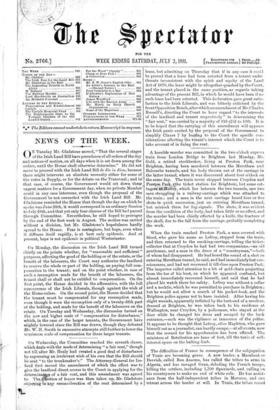On Wednesday, the Committee reached the seventh clause, which deals
with the mode of determining " a fair rent," though not till after Mr. Healy had created a good deal of disturbance by expressing an irrelevant wish of his own that the Bill should be sent " to the trunkmaker's." The Attorney-General for Ire- land first moved the amendment of which the effect was to give the landlord direct access to the Court in applying for the
r
determin ' of a fair rent, and this amendment was agreed to. The tion of leaves was then taken up, Mr. Gladstone objeeltingay reconsideration of the rent determined by a lease, but admitting on Thursday that if in any case it could be proved that a lease had been extorted from a tenant under threats inconsistent with the spirit and equity of the Land Act of 1870, the lease might be altogether quashed by the Court, and the tenant placed in the same position, as regards taking advantage of the present Bill, in which he would have been if no such lease had been extorted. This declaration gave groat satis- faction to the Irish Liberals, and was bitterly criticised by the front Opposition Bench, after which an amendment of Mr. Charles Russell's, directing the Court to have regard "to the interests of the landlord and tenant respectively " in determining the " fair rent," was carried by a majority of 116 (252 to 136). It is to be hoped that the carrying of this amendment will appease the Irish panic excited by the proposal of the Government to simplify Clause 7 by leaking to the Court the specific con- siderations affecting the tenant's interest which the Court is to take account of in fixing the rent.


































